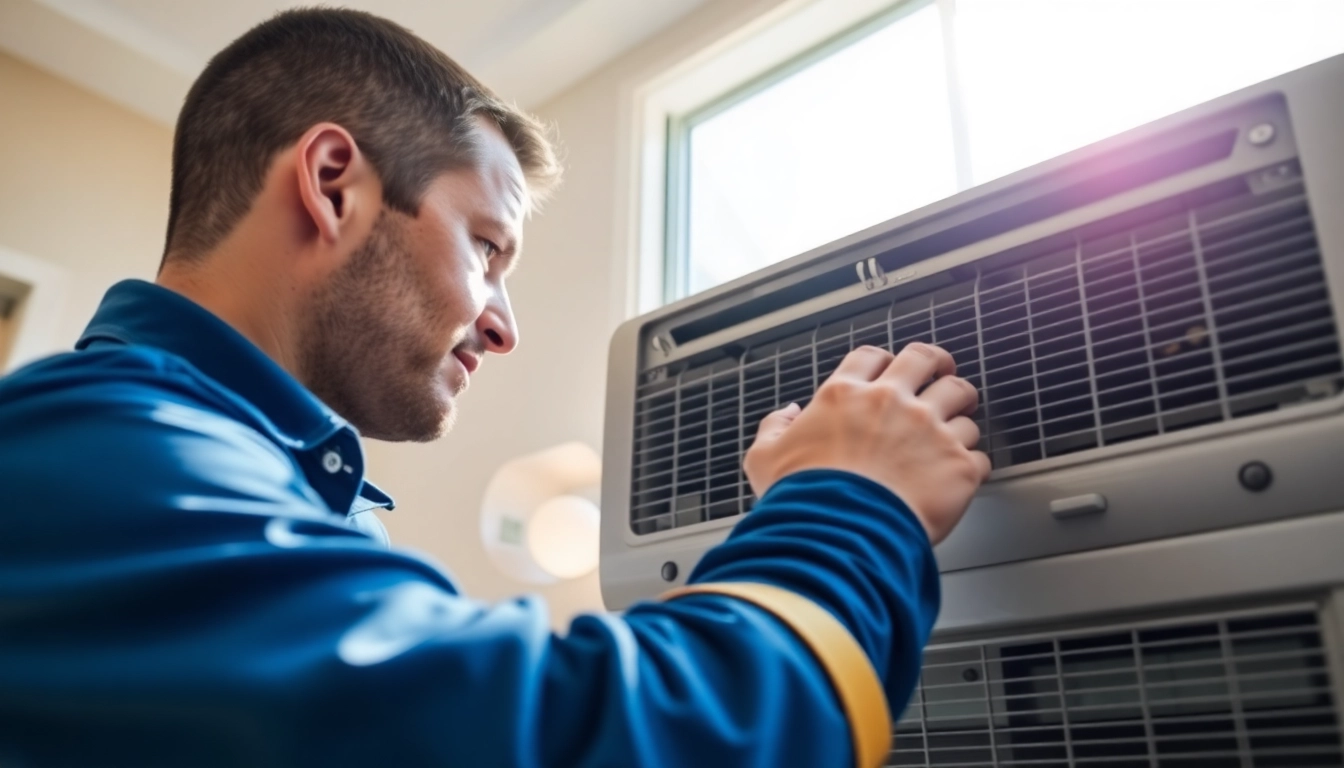
Understanding AC Repair Needs
As the summer heat rolls into Glendale, AZ, having a well-functioning air conditioning unit becomes crucial for comfort. Unfortunately, air conditioning systems can encounter various issues that necessitate timely repairs. Understanding common air conditioning problems is essential for homeowners and businesses alike to ensure optimal performance and comfort. If you’re facing issues with your AC, you may find yourself searching for ac repair glendale az. This comprehensive guide will delve into the vital aspects of AC repair, educating you on the signs, processes, and costs involved.
Common Air Conditioning Issues in Glendale
Air conditioning systems are intricate machines that can face multiple challenges over their lifespan. In Glendale, where temperatures can soar, the following issues are frequently observed:
- No Cool Air: One of the most common problems is when the AC unit fails to produce cold air due to refrigerant leaks, compressor issues, or malfunctioning thermometers.
- Strange Noises: Unusual sounds, such as banging, hissing, or rattling, can indicate mechanical problems, loose components, or debris in the system.
- Water Leaks: Excess moisture can lead to water pooling around the unit, often caused by clogged condensate drains.
- Frequent Cycling: If your AC turns on and off frequently, it could be a sign of an improperly sized unit or problems with the thermostat.
- Unpleasant Odors: Odd smells can indicate mold growth or metabolic issues within the system, leading to reduced indoor air quality.
Signs You Need AC Repair Services
Recognizing the signs of malfunction early can save you time and money on repairs. Key indicators that you may need to call an AC professional include:
- Increased Energy Bills: A sudden spike in your electricity bill could indicate your AC is working harder due to inefficient operation.
- Inconsistent Temperatures: If some rooms are cooler than others, it might point to duct issues or inadequate airflow.
- Lengthy Operating Times: If your unit runs for extended periods without appropriately cooling your home, it may require servicing.
- Humidity Issues: High humidity levels indoors can suggest that your AC is unable to effectively remove moisture.
The Importance of Regular Maintenance
Regular maintenance is essential to ensure the longevity and efficiency of your air conditioning system. During maintenance visits, technicians can:
- Inspect and replace filters to improve airflow and indoor air quality.
- Check refrigerant levels to ensure sufficient cooling power and prevent compressor damage.
- Clean coils to enhance energy efficiency and cooling performance.
- Identify potential problems before they escalate into costly repairs.
- Provide tips for maintaining your system throughout the year.
The cost of regular maintenance is often significantly lower than the expense incurred from major repairs or a full system replacement.
Choosing the Right AC Repair Service
When in need of AC repair, selecting a reputable service provider is crucial. Given the abundance of HVAC companies in Glendale, it’s important to make an informed choice.
Factors to Consider When Selecting a Company
Choosing the right HVAC provider involves several considerations:
- Licensing and Insurance: Verify that the company holds the necessary licenses and insurance coverage to protect you against liabilities.
- Experience: Look for a company with extensive experience in performing AC repairs. Experienced technicians are more adept at diagnosing and troubleshooting issues.
- Service Offerings: Ensure the company provides a wide range of services, including emergency repairs, preventive maintenance, and installation services.
- Response Time: Inquire about their availability and typical response times, especially during peak seasons.
Comparing Local HVAC Providers
It’s beneficial to compare several local providers to find the best fit for your needs. To facilitate this process, consider the following steps:
- Gather estimates from multiple companies for the same repair service.
- Check online directories and local listings for ratings and reviews.
- Ask for referrals from friends, neighbors, or family members who have recently hired HVAC services.
Reading Reviews and Ratings
Online reviews can provide valuable insights into a company’s reputation and customer satisfaction levels. Look for feedback on:
- Quality of service provided.
- Professionalism and courtesy of technicians.
- Timeliness in service delivery.
- Honesty regarding pricing and service recommendations.
Pay attention to both high and low ratings for a balanced perspective. Look for recurring themes in customer comments that may highlight specific strengths or weaknesses.
AC Repair Process Explained
Understanding the AC repair process can help you better prepare for what to expect when a technician visits your home. It typically involves several stages:
Initial Inspection and Diagnosis
The first step in the repair process is an initial inspection and diagnosis. During this phase, the technician will:
- Conduct a thorough evaluation of your AC system to determine its operational status.
- Test relevant components such as the thermostat, compressor, and electrical connections.
- Listen for unusual sounds and assess the airflow throughout your home.
Common Repair Techniques Used
Once the diagnosis has been completed, the technician will recommend necessary repairs. Common repair techniques may include:
- Replacing faulty components such as capacitors, contactors, or motors.
- Sealing duct leaks to optimize airflow and energy efficiency.
- Recharging the refrigerant if levels are low, ensuring the AC unit can cool effectively.
- Clearing clogs in condensate lines to prevent water overflow.
Tools and Equipment HVAC Technicians Utilize
The right tools are essential for efficient and effective AC repairs. HVAC technicians typically use:
- Manifold gauges for measuring refrigerant pressure.
- Multimeters for electrical troubleshooting.
- Vacuum pumps for removing moisture from refrigerant lines.
- Thermometers to ensure the system is cooling at the right capacity.
Cost Considerations for AC Repair in Glendale
Understanding the potential costs associated with AC repairs will help you budget effectively and avoid surprises. Here’s what to consider:
Typical Costs for Common Repairs
The cost of repairs can vary depending on the type of issue and the make and model of the AC unit. Typical repair costs might be:
- Refrigerant recharge: $100 – $300
- Thermostat replacement: $100 – $200
- Capacitor replacement: $100 – $500
- Compressor replacement: $1,200 – $2,500
These costs can fluctuate based on the complexity of the repair and local service charge rates.
Understanding Pricing Structures
HVAC companies may structure their pricing in various ways:
- Flat Rate Pricing: A predetermined charge for specific repairs regardless of the time taken.
- Hourly Rates: Technicians charge based on the actual time spent on the job, which may include a minimum service charge.
Clarifying the pricing structure before agreeing to a service is critical, ensuring you’re fully aware of potential costs.
Financing Options Available
In many cases, significant repairs can put a strain on your finances. Some local HVAC companies offer financing options, allowing homeowners to spread the cost of repairs over time. Common financing methods include:
- Flexible payment plans that fit your budget.
- Credit options through third-party lenders.
- Seasonal promotions or discounts for repairs.
Be sure to inquire about financing options at the time of service to find the best solution for your financial situation.
Preventive Measures for Your Air Conditioner
Taking preventive measures can significantly reduce the likelihood of costly repairs. Here are some proactive strategies to keep your AC running smoothly:
Tips for Maintaining Your AC Unit
Simple maintenance tasks you can perform include:
- Regularly replace or clean filters to keep airflow unrestricted.
- Clear debris from around the outdoor unit to ensure optimal performance.
- Check and seal ductwork for leaks to enhance efficiency.
- Utilize programmable thermostats for better temperature control.
When to Schedule Professional Maintenance
Scheduling a professional maintenance check at least once a year is advisable, ideally before the heavy cooling period begins. An expert technician can perform a thorough inspection and tune-up, which will prolong the life of your AC and maximize efficiency.
Benefits of Preventive Maintenance Plans
Investing in a preventive maintenance plan offers numerous advantages:
- Priority service during peak seasons.
- Discounts on repair services and products.
- Increased operational efficiency, lowering energy bills.
- Enhanced longevity of your system.
With the right preventive strategy, you can ensure that your AC unit remains in peak condition, ready to battle the intense Arizona heat. Being proactive will save you time, money, and stress in the long run.





